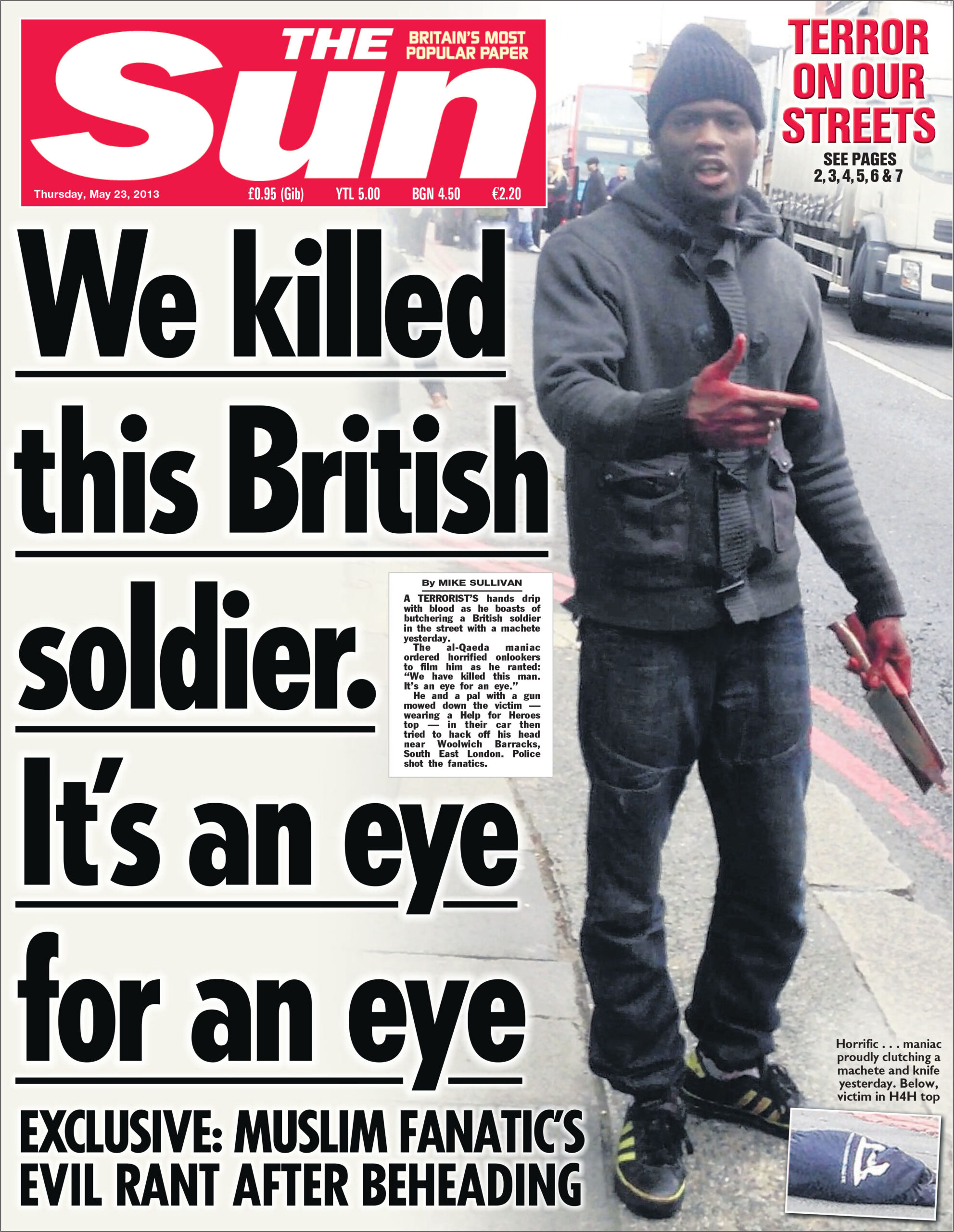Like a still from a cheap horror flick, Michael Adebolajo stands with a meat cleaver and a large knife clasped in one hand. His free hand, saturated in blood, is raised towards the camera. Together with his accomplice and fellow convert Michael Adebowale, he has just murdered off-duty Fusilier Lee Rigby. Ten years ago today, this grisly scene on the streets of Woolwich was splashed across almost every newspaper front page. It is one of the most sensational — and complained about — images in the history of both the British media and the fight against terror.
The scene painted by the footage is both horrifyingly perplexing and peculiarly British. The sky is overcast. No one seems to be running or screaming, or trying to confront and overpower the killers. A consolatory moment is provided by the “Angel of Woolwich”, the woman who calmly conversed with and challenged the killers before taking off to catch her bus. In the background, there is a bundle in the middle of the road. It is the body of Lee Rigby.
Michael Adebolajo grew up and went to school in Havering, where East London spills into Essex. Nevertheless, he addresses bystanders as “you people”, telling them they will “never be safe” before warning that British soldiers must leave “our lands”, meaning Iraq and Afghanistan. To his mind, he is no longer a British man born to a Nigerian-Christian family and schooled in Romford, but a member of the global Ummah, which is under existential attack from the West.
The murderers never attributed their attack to al-Qaeda, but in many ways it fit the al-Qaeda bill. It was a highly specific act of violence, targeting a member of the enemy’s armed forces. It was the kind of attack the group’s Yemen branch had directly called for in their English-language magazine less than a year beforehand. It was so discriminate that Adebolajo was careful to assure bystanders they were not his targets, even going so far as to apologise to nearby women for the bloodshed. Two years later, the al-Qaeda trained Charlie Hebdo killers would similarly — and impatiently — remind a journalist that they had only killed blasphemers; that they hadn’t harmed “civilians”. This was honour, jihadi-style.

In other ways, Lee Rigby’s murder was the kind of gruesome spectacle that al-Qaeda’s leadership would later warn against, but which Islamic State would make their hallmark. A gruesome spectacle, but a shoddy and amateurish one, too: Adebolajo and Adebowale rammed Lee Rigby with a Vauxhall Tigra before trying, and failing, to behead their victim. The rusty antique revolver they had acquired malfunctioned, and they were denied martyrdom by arriving armed police.
By contrast, the Charlie Hebdo attackers came clad in all black tactical gear, wielded Kalashnikovs and raised their fists having avenged the Prophet. They looked the business, and they went down in a hail of bullets. Adebolajo, in his Stone Island beanie and Primarni toggle jacket, did not. Adebolajo and Adebowale didn’t pledge allegiance to al-Qaeda in their attack, but perhaps notably, al-Qaeda never claimed them either.
Still, this did not stop others from imitating them. As Raffaello Pantucci notes, it served to “lower the threshold of what constitutes a terrorist attack, suddenly making the act much more accessible”. It showed other extremists that neither a cell, explosives nor serious weaponry were necessarily prerequisites to action. In the days to follow, a soldier was stabbed in the neck in Paris, while a year later another young extremist convert was apprehended en route to behead a British soldier. Brusthom Ziamani, the would-be copycat who thought Michael Adebolajo a “legend”, has since emerged as a leading and troublesome figure among imprisoned jihadis. In 2020, while he was eight months into a deradicalisation programme, he attempted to murder a prison officer.
The fact that Adebolajo and Adebowale were careful to target a soldier — and only a soldier — reveals much about the evolution of jihadism and the ideological divides within it. While mass casualty attacks are associated with jihadist terror, prior to Isis, discriminate plots were more the norm in Europe: against Jews, military personnel and alleged blasphemers. There were even bitter divides within Adebolajo and Adebowale’s networks: some believed that attacks at home were illegitimate due to a covenant of security with Britain, while others came to view the covenant as null and void since UK participation in the invasion of Iraq.
The 7/7 bombers deemed Britain a legitimate target, but it was not until Lee Rigby’s murder that jihadists were able to successfully attack again — an eight-year wait. Some observers assumed the jihadist threat was a thing of the past: Bin Laden was dead and the London Olympics came and went without a hitch. But it was the same year as the Woolwich attack that British extremists were trickling into Syria to fight — a trickle that became a flood in 2014 when Isis declared it had restored the Caliphate.
In the eight “quiet” years between attacks, Salafi-jihadist activity did not cease. The Islam that Adebolajo and Adebowale had converted to was the Islam of Omar Bakri Mohammad, Anjem Choudary and their acolytes in al-Muhajiroun. Its activity during the 2000s and early 2010s consisted of proselytising, attention-grabbing stunts, establishing European offshoots, and more proselytising. On a day-to-day basis, it also meant living according to the incredibly strict, incredibly demanding lifestyle of a Salafi-jihadist activist, which often involved cutting oneself off from friends, family, jobs and many of life’s pleasures — from football to television. It was to enter a totalitarian pact voluntarily.
Because of his closeness to these networks, Adebolajo had flirted with the attention of security services on several occasions, but never enough to warrant intervention. In 2010, however, he was apprehended by Kenyan authorities; he was most likely on the way to join al-Shabaab in Somalia, with whom a number of Britons were already fighting at the time. Despite this, a Parliamentary Intelligence and Security Committee report determined MI5 could not have prevented the attack. Instead, it blamed an unnamed American company — Facebook — which had closed several of Adebowale’s accounts without informing British authorities. Five months prior to the attack, Adebowale had even graphically communicated his desire to kill a British soldier. The trouble was the offending content was picked up algorithmically and closed automatically — no human being ever laid eyes on it.
At the time, Sir Malcolm Rifkind, Chair of the Intelligence and Security Committee, determined that Facebook was the “one party which could have made a difference” in preventing the murder of Lee Rigby. In some quarters, particularly among civil liberties groups, this conclusion was viewed as all too convenient for the security services, as well as paving the way for more anti-terror legislation and more government control over the internet. The drumbeat for tech companies to act on terrorist and extremist content online would grow louder the following year, as Isis flooded social media with gore and Silicon Valley could no longer refuse to act. Today, it is nongovernmental groups as much as governments leading the charge for more control over the internet.
And yet, despite the infamy of Michael Adebolajo’s image, neither he nor his accomplice live on in the annals of jihadi lore. Although I’m told security services would cast doubt on these claims, Adebolajo allegedly regrets his act and the Jihadist worldview, a fact which is of no consolation to the family of his victim. Instead, it is Lee Rigby’s name and image which lives on — while his killers, denied their martyrdom, must live out their days anonymously and forgotten, somewhere in the bowels of His Majesty’s prison estate.
Disclaimer
Some of the posts we share are controversial and we do not necessarily agree with them in the whole extend. Sometimes we agree with the content or part of it but we do not agree with the narration or language. Nevertheless we find them somehow interesting, valuable and/or informative or we share them, because we strongly believe in freedom of speech, free press and journalism. We strongly encourage you to have a critical approach to all the content, do your own research and analysis to build your own opinion.
We would be glad to have your feedback.
Source: UnHerd Read the original article here: https://unherd.com/


